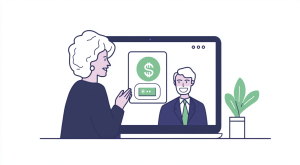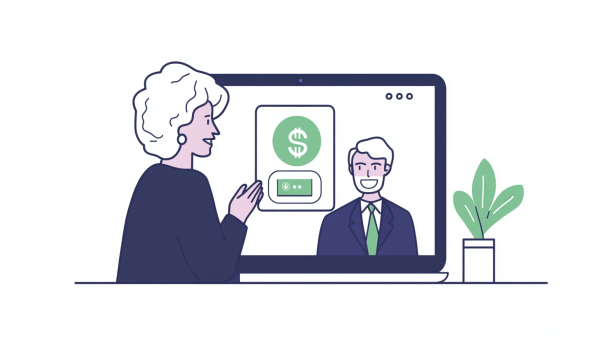Advance Fee Scams: How Fraudsters Trick You Into Paying Money Upfront Through Your Bank
Advance fee scams represent one of the oldest and most persistent forms of fraud, now modernised for the digital banking era. These schemes all share a common thread: victims are promised something of significant value—a loan, prize, inheritance, business opportunity, or high-return investment—but must first pay various “fees,” “taxes,” or “processing charges” via bank transfer to receive it.
What makes these scams particularly effective in today’s environment is how they exploit legitimate banking services and faster payment systems to extract money from victims quickly and irretrievably.
Understanding Advance Fee Fraud and Banking Connections
The fundamental psychology behind advance fee fraud is powerful:
- Future reward focus: Victims concentrate on the promised larger gain, making smaller upfront payments seem reasonable
- Banking legitimacy: Using bank transfers lends an air of credibility to the transaction
- Incremental extraction: Payments start small and gradually increase as victims become more committed
- Digital distance: The entire scam can be executed remotely through banking apps and electronic communications
Let’s examine the most common types of advance fee scams that rely on bank transfers and how to protect yourself.
Loan and Credit Advance Fee Scams
How the Bank Transfer Process Works
- Targeted advertising: You encounter an advert promising loans with “no credit check” or “guaranteed approval”
- Application process: You provide personal and financial details through an online form
- Quick approval: You receive rapid approval for a loan amount, often larger than requested
- Fee requirement: Before funds can be released, you must pay an “insurance fee,” “processing charge,” or “security deposit”
- Bank transfer instruction: The “lender” provides bank details for you to send this payment
After transferring the fee via your banking app, either additional fees emerge or the promised loan never materialises.
Banking Red Flags
- Requests to pay fees before receiving loan funds
- Instructions to make payments to personal rather than business accounts
- Account details that don’t match the supposed lending company
- Pressure to use faster payments rather than other payment methods
Real-World Example
Paul, struggling with debt, was rejected by mainstream lenders. He found a website offering “guaranteed loans regardless of credit history.” After applying for a £5,000 loan, he was quickly approved but told he needed to pay a £250 “security deposit” first, which would be returned with his loan.
After transferring the £250 from his Santander account, Paul was informed that due to his poor credit score, he needed to pay an additional £450 “insurance fee.” When he questioned this, the representative explained it was standard practice and would be refunded with his loan. After sending this second payment, the company became unreachable, and Paul lost £700 with no loan forthcoming.
Inheritance and “Unexpected Windfall” Scams
The Banking Payment Chain
- Unexpected notification: You receive an email, letter, or message about a substantial inheritance or unclaimed funds
- Convincing documentation: The scammers provide official-looking documents to validate the claim
- Legal/processing requirements: You’re told that to release the funds, various fees must be paid
- Multiple transfers: Each payment leads to new complications requiring additional transfers
- Bank transfer mechanism: All payments are made through your banking app to accounts that frequently change
Common Payment Requests
- “Legal fees” to process documentation
- “Tax clearance” charges
- “Anti-money laundering” verification costs
- “Transfer fees” for international transactions
- “Release certificates” from regulatory authorities
Real-World Example
Margaret received an email from a “solicitor” claiming she was the distant relative of a deceased person with the same surname who had left an estate worth £2.3 million. The email included convincing legal letterheads and reference numbers.
The “solicitor” explained that to process her claim, she needed to pay £1,800 in legal fees. Margaret transferred this amount from her Halifax account. After this payment, she was told she needed to pay £3,500 for “inheritance tax clearance” before the funds could be released. When she sent this amount, another fee emerged. Margaret lost over £8,000 before realising no inheritance existed.
Lottery and Prize Notification Scams
The Win Payment Process
- Winner notification: You receive a message claiming you’ve won a major prize in a lottery or competition
- Verification request: The message includes official-looking documentation and references
- Fee requirement: To claim your winnings, you must pay “processing fees,” “taxes,” or “customs charges”
- Banking details provided: You’re given account information for transferring these charges
- Escalating payments: Each payment leads to new complications requiring additional fees
Banking Red Flags
- Being asked to pay fees for prizes in competitions you don’t recall entering
- Requests to keep your “win” confidential
- Pressure to make immediate transfers to avoid losing the prize
- Bank details that change between payments
- Instructions to disguise the true purpose when making transfers
Real-World Example
James received an official-looking email claiming he had won £750,000 in the “European Lottery Commission” draw. The email contained logos, reference numbers, and was signed by someone claiming to be a lottery official.
To receive his winnings, James needed to pay £890 for “processing and verification.” After transferring this amount from his NatWest account, he was told he needed to pay an additional £2,300 for “tax clearance.” When he questioned this, the “lottery official” sent what appeared to be government tax documents. After sending the second payment, James was asked for a third fee, at which point he realised he’d been scammed.
Job Opportunity and Employment Advance Fee Scams
The Employment Fee Funnel
- Job advertisement: You see an attractive job opportunity with excellent pay and benefits
- Quick selection: After minimal screening, you’re selected for the position
- Pre-employment requirements: Before starting, you must pay for training, equipment, security clearance, or other setup costs
- Banking transfer request: You’re provided bank details to make these mandatory payments
- Additional costs: After initial payment, more costs emerge before you can start earning
Common Fee Justifications
- Work equipment or software packages
- Training courses or certification
- Background checks or security clearance
- Visa or work permit processing
- Administrative setup or registration fees
Real-World Example
Sophie, recently redundant, found a job advert for a “Remote Executive Assistant” position paying £35,000 per year. After a brief online interview, she was offered the position but told she needed to pay £350 for “specialised software and security access.”
Sophie transferred the money from her Nationwide account. The “employer” then said she needed to pay an additional £750 for “company certification and remote training.” When Sophie became hesitant, they pressured her, saying several other candidates were waiting for the position. After sending the second payment, all contact ceased, and the company’s website disappeared.
Business Opportunity and Investment Advance Fee Scams
The Business Payment Trap
- Opportunity presentation: You’re offered a lucrative business opportunity with minimal risk
- Exclusive access: The offer is presented as available to only a select few
- Initial investment: To secure your position, you must make an upfront payment
- Banking mechanism: You transfer funds via your banking app to “lock in” your opportunity
- Recurring demands: Initial payment leads to requests for additional funds for “unexpected developments”
Common Opportunity Types
- Distributorships or franchises
- Import/export deals with guaranteed buyers
- High-yield investment programmes
- “Ground floor” opportunities in emerging markets
- Commodity trading with guaranteed returns
Real-World Example
Alan was approached via LinkedIn about an “exclusive import/export opportunity” with guaranteed profits. The contact, claiming to represent a major international trading company, explained that with just a £5,000 initial investment, Alan could earn £10,000-£15,000 monthly by facilitating trades.
After several persuasive calls and impressive documentation, Alan transferred £5,000 from his Barclays account. Soon after, he was told that to complete his registration and receive his first shipment, he needed to pay an additional £3,500 for “customs clearance and insurance.” After sending this amount, he was asked for yet another payment. Alan eventually lost £12,000 before discovering the entire operation was fraudulent.
Property and Rental Advance Fee Scams
The Property Fee Chain
- Attractive listing: You find a property for rent or purchase at a competitive price
- Application process: You express interest and submit personal information
- Fee requirements: Before viewing or securing the property, you must pay for credit checks, holding deposits, or security fees
- Banking transfer: You send money via your banking app to the supposed landlord or agent
- Disappearing act: After payment, the property becomes “unavailable” or the agent disappears
Banking Warning Signs
- Requests for payments before viewing a property
- Pressure to transfer money quickly to “beat other applicants”
- Reluctance to use proper tenancy deposit protection schemes
- Bank accounts that don’t match the estate agency’s official details
Real-World Example
Rachel found an attractive London flat advertised on a property website at below-market rent. When she enquired, the “landlord” explained he was currently overseas but could offer a virtual tour.
To “secure” the property before his return, Rachel needed to transfer a £1,200 deposit. After sending this from her Monzo account, the landlord claimed there was high interest in the property and suggested she pay the first month’s rent of £1,200 to guarantee it would be hers. After this second transfer, all contact ceased. Rachel later discovered the property photos had been stolen from a legitimate listing elsewhere.
Romance and Relationship Advance Fee Scams
The Relationship Payment Process
- Connection establishment: Scammers build emotional relationships through dating sites or social media
- Trust development: They invest weeks or months building trust and emotional attachment
- Crisis creation: Once sufficiently connected, they present an emergency requiring financial help
- Banking solution: They provide bank details for you to send money to resolve their “crisis”
- Ongoing extraction: Initial help leads to additional crises requiring more payments
Common Crisis Scenarios
- Medical emergencies requiring treatment payment
- Legal troubles requiring fees for release
- Robberies while travelling, requiring money to return home
- Business crises requiring capital to avoid bankruptcy
- Family emergencies requiring immediate financial assistance
Real-World Example
William met “Alexandra” on a dating site. She claimed to be a British businesswoman temporarily working in Turkey. After two months of daily messages and occasional video calls (always with convenient “connection issues”), Alexandra said her business was in crisis after a supplier defrauded her.
She needed £4,000 to fulfil a critical order and avoid bankruptcy. William transferred the money from his HSBC account. Within weeks, another crisis emerged—Alexandra had been in an accident and needed £2,500 for medical treatment not covered by insurance. After sending more money, William was asked for additional funds to pay for her flight home. He lost over £12,000 before his son convinced him it was a scam.
Pet and Animal Purchase Advance Fee Scams
The Pet Payment Funnel
- Attractive listing: You find a pedigree pet advertised online at a reasonable price
- Seller engagement: The “breeder” responds with compelling photos and information
- Deposit request: You’re asked to secure the animal with a deposit via bank transfer
- Delivery complications: After the deposit, transport issues arise requiring additional payments
- Multiple fees: Each payment leads to new problems requiring further transfers
Common Additional Fee Types
- Special crate or container costs
- Vaccinations and veterinary certificates
- Insurance for transportation
- Quarantine or customs fees
- Temperature-controlled transport supplements
Real-World Example
Emma found a French Bulldog puppy advertised online for £1,500—well below the typical £2,500-£3,500 price. The “breeder” explained they were relocating abroad and needed to find good homes quickly.
After transferring a £500 deposit from her TSB account, Emma was told the puppy needed special transportation costing an additional £350. After sending this amount, she was informed that the puppy required vaccination certificates costing £280. When yet another fee emerged for “temperature-controlled shipping,” Emma realised she was being scammed, having already lost £1,130 with no puppy forthcoming.
The Banking System Vulnerability: Why Advance Fee Scams Succeed
Advance fee scams exploit several features of modern banking:
Faster Payments Technology
- Immediate transfers: The Faster Payments system means money moves instantly to fraudsters
- Irreversibility: Unlike card payments, bank transfers cannot be easily recalled once sent
- Multiple movements: Funds can be quickly dispersed through numerous accounts to avoid detection
Digital Banking Convenience
- Remote authentication: Banking apps allow transfers to be made anywhere, anytime
- Limited verification: Automated systems may not detect unusual payment patterns
- User authority: Since you authorised the payment, banks historically considered it legitimate
Psychological Factors
- Future focus: Concentration on the promised larger gain makes smaller upfront payments seem reasonable
- Incremental commitment: Each payment increases psychological investment in the scam’s legitimacy
- Embarrassment: Victims often feel ashamed and delay reporting, giving scammers more time
How to Protect Yourself When Using Banking Apps
- Question upfront fees: Legitimate organisations rarely require payment before providing goods or services
- Research thoroughly: Before making any payment, verify the company’s existence through independent channels
- Check bank details: Confirm that account information matches official company records
- Verify credentials: Check regulatory registrations for financial services, recruiters, or property agents
- Use the 24-hour rule: Wait a full day before making any unexpected transfer, regardless of pressure
- Consult others: Discuss the situation with trusted friends or family before sending money
- Heed bank warnings: Take seriously any fraud alerts your bank raises during the transfer process
- Use protected payment methods: When possible, use credit cards or payment platforms with buyer protection
If You’ve Been Scammed Through Your Banking App
If you’ve fallen victim to an advance fee scam involving bank transfers:
- Contact your bank immediately: Report the fraud as soon as possible—every minute counts
- Report to Action Fraud: File an official report with the UK’s national fraud reporting centre
- Preserve evidence: Save all emails, messages, and payment confirmations
- Check reimbursement eligibility: Under regulations effective October 2024, many APP scam victims have strengthened rights to compensation
How APP Claims Can Help You
At APP Claims, we specialise in helping victims of advance fee APP fraud recover their money, even when banks have initially rejected reimbursement requests:
- Expert case assessment: We’ll evaluate your situation free of charge
- Specialised knowledge: Our team understands the complex mechanisms of advance fee scams
- Bank negotiation: We handle all communications with financial institutions
- Evidence compilation: We build compelling cases that banks cannot dismiss
- Ombudsman escalation: When necessary, we take your case to the Financial Ombudsman Service
All on a No Win, No Fee basis.
Advance fee scams may be among the oldest forms of fraud, but they continue to evolve with technology. If you’ve been victimised, contact APP Claims today to explore your reimbursement options and begin your financial recovery journey.
This information is regularly updated as advance fee scam tactics evolve. Last updated: April 2025.








